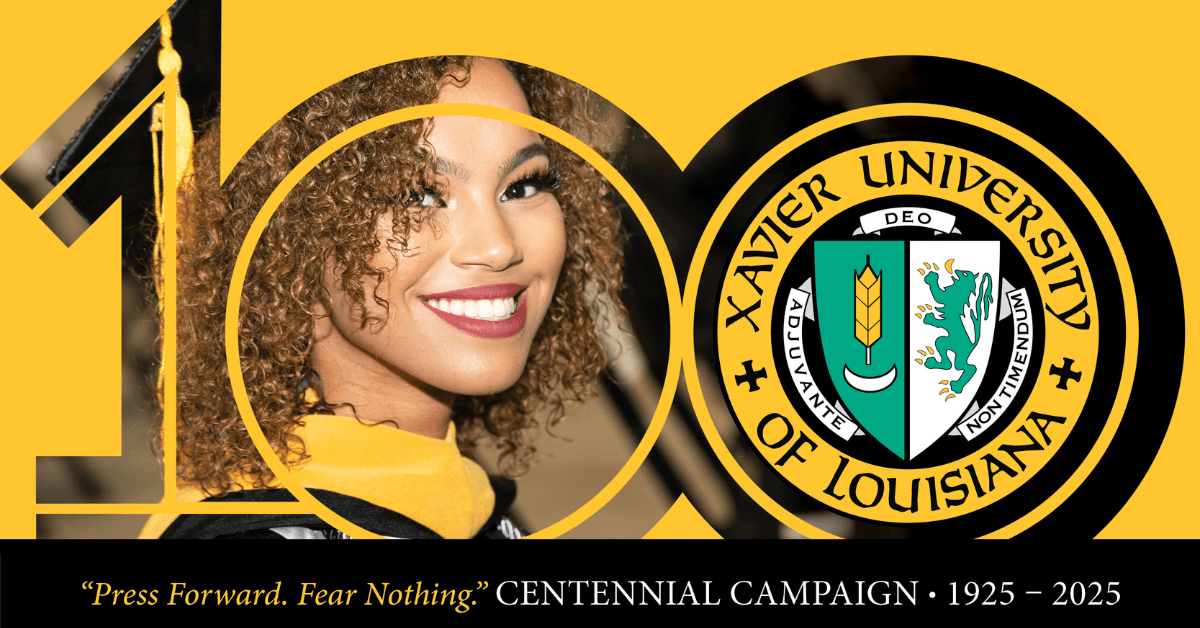KEY INSIGHTS:
- The New Orleans-based HBCU has just launched a $500 million capital campaign.
- Half of the money raised will go towards Xavier’s main priority, need-based scholarships to make the school more accessible.
- The outcomes the school hopes for from the campaign would secure its long-term future as it enters a new century.
Xavier University of Louisiana is undergoing a transformation. As the New Orleans-based HBCU nears its centennial, the school has just launched a $500 million capital campaign to revamp the school and create new opportunities for students and faculty for decades to come.
The Centennial Campaign was created to answer a series of “what ifs” — What if every student could afford a Xavier education? What if they didn’t have to worry about skipping meals? What if the campus environment matched its potential? What if Xavier could expand faculty opportunities and invest in more academic programs?
Since launching the half-billion-dollar campaign at the beginning of November, around $70 million has already been raised, Xavier President Reynold Verret told The Plug. The school is looking at federal, corporate, philanthropic and alumni funding to reach its goal.
Over the coming years, the $500 million will be split between four main priorities:
1. Making Xavier more affordable
President Verret is looking to the past to inform Xavier’s future. The school was founded to serve the underserved and is continuing that work by putting half of the funding — $250 million — towards creating more need-based scholarships.
Almost all Xavier students rely on some amount of scholarships. In 2021, 89 percent of undergraduates at Xavier were receiving financial aid from federal, state, institutional or other sources, according to data from the National Center for Education Statistics.
“How do we make that [aid] available so that no talented young woman or man, who needs and could come to Xavier, would be denied Xavier because their family was not so wealthy?” Verret said. “We want to lower the financial barriers that these students face.”
2. Building new facilities and upgrading existing ones
Xavier plans to put $105 million from the campaign into campus upgrades, everything from new science laboratories to adding a performing arts and exhibition space as well as an intramural athletics field.
Verret explained that extracurricular spaces are important for a Xavier education too because they add another dimension to students’ experience. “Things like [dance, sports, art], students must be able to do to find the joy in their learning,” he said.
The school also has plans to renovate the historic Sisters of the Blessed Sacrament Convent and build a new residence hall.
3. Enriching students’ lives outside the classroom
Alongside new extracurricular spaces, $75 million will be put towards programs that help support students’ health and well-being. “There’s a lot of learning that occurs between classes in the halls of Xavier as well,” Verret said.
Xavier plans to have an in-house nutritionist, food pantry, community garden, fitness instructors
and fitness equipment available to students for their physical health. In terms of mental health, the school plans to have a full-time medical director and staff psychiatrist.
The school also plans to focus on increasing academic support through high school-to-college bridge programs, academic advisors and career coaching.
Verret said that they are also looking to increase support to campus newspapers and study abroad programs, potentially endowing some funds to ensure students in years to come have the opportunity to go abroad.
“It should not be that [only the] students whose families have the means can be able to study abroad, because we need Xavierites to understand that there’s a world beyond New Orleans, beyond the U.S.,” he said.
4. Recruiting and retaining faculty
Finally, $70 million will be allocated for Xavier professors. “The reason for our success is our quality faculty,” Verret said.
The funding will be put towards raising faculty salaries, developing new academic programs, bringing in visiting professors, enhancing faculty support programs and creating new faculty chairs.
Some of the new programs that could be developed are African-American Diasporic Cultural Studies, Health Care Management, Data Science and Analytics, and an Institute for Pastoral Studies.
Securing Xavier’s long-term future
Separate from the goals laid out in the $500 million capital campaign, but potentially as transformational, is Xavier’s efforts to create a new Graduate School of Health Sciences and Medical School. The HBCU is already one of the top two universities in the country when it comes to sending Black students to medical school, according to the Association of American Medical Colleges. Creating its own medical school would just be an extension of that work.
Verret said they are currently doing feasibility and due diligence work on the graduate school and have not come to a final decision on whether to move forward, but that the initiatives that will be put in place through the centennial campaign would increase the numbers of Xavier students who are ready to go to medical school.
It is just one of the campaign outcomes that will have impacts on Xavier for decades to come. But Verret stresses that the school cannot do this work alone.
“The relevance and importance of HBCUs, especially schools like Xavier and some of our peer institutions, is all the more important as we become this society of many people,” Verret said. “We have a part that we need to take for the country to become great. We continue to do our part, others should be joining with us to do their parts as well.”








